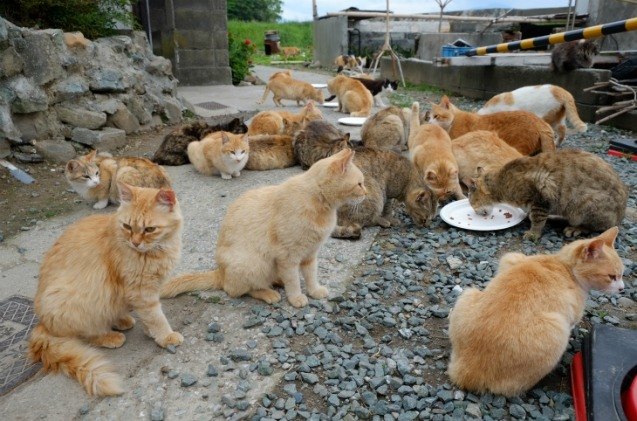Japanese Officials Look Into Spay and Neuter Options for Island Overru

There is a very unique island in Japan–Aoshima. It is part of the Ehime Prefecture, and only claims 13 humans as its residents. Contrastingly, it also claims 130 cats as its inhabitants, and it’s Japan’s most famous cat island (yes, there are others!). Visitors come from around the world to see an island literally overrun with cats who freely wander the streets of the island.
Related: Who Knew? Abu Dhabi Has Its Very Own “Cat Island”
But officials fear that there may be too many cats now (ummm, maybe, you think?) and the Aoshima Cat Protection Society is recommending that they all be spayed or neutered to help reduce the population. The Aoshima Cat Protection Society is mainly in charge of the care and welfare of the cats, as the average age of the 13 residents is over 75-years-old.
Because the citizen population keeps reducing (down two humans compared to 15 humans living there four years ago), and there is no real infrastructure for the island (or the cats), the Society began a spay/neuter campaign last July and now has the city designating funds to spay and neuter the cats.
Related: Island Full of Stray Dogs Is Puppy Paradise [Video]
Veterinarians working with the animal-welfare organization Dobutsu Kikin would travel to Aoshima and perform the procedures. This would mean they’d need to stay on the island as well, and travel and lodging expenses can add up. The island’s a large tourist destination, but there is not one bit of revenue that comes from Aoshima as there is no commerce–not even vending machines. The Society simply cannot maintain expense of care, and believes that allowing the cats to just wander in packs could eventually present hygenic or other feral colony issues they want to nip in the bud now.
As the Japanese fiscal year begins this spring, they hope that the funding initiative is approved and they can begin the procedures immediately after so that they can reduce and restrict the birth of new kittens who will require care.

More by Lori Ennis























